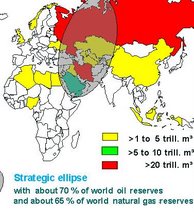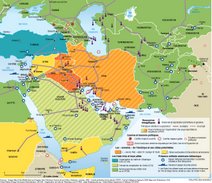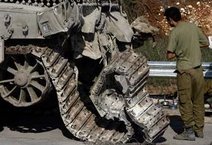
Zionism and the Third Reich, Common Aims
Early in 1935, a passenger ship bound for Haifa in Palestine left the
German port of Bremerhaven. Its stern bore the Hebrew letters for its
name, "Tel Aviv," while a swastika banner fluttered from the mast. And
although the ship was Zionist-owned, its captain was a National
Socialist Party member. Many years later a traveler aboard the ship
recalled this symbolic combination as a "metaphysical absurdity."1
Absurd or not, this is but one vignette from a little-known chapter of
history: The wide-ranging collaboration between Zionism and Hitler's
Third Reich.
Early in 1935, a passenger ship bound for Haifa in Palestine left the
German port of Bremerhaven. Its stern bore the Hebrew letters for its
name, "Tel Aviv," while a swastika banner fluttered from the mast. And
although the ship was Zionist-owned, its captain was a National
Socialist Party member. Many years later a traveler aboard the ship
recalled this symbolic combination as a "metaphysical absurdity."1
Absurd or not, this is but one vignette from a little-known chapter of
history: The wide-ranging collaboration between Zionism and Hitler's
Third Reich.
Common Aims....
Over the years, people in many different countries have wrestled with
the "Jewish question": that is, what is the proper role of Jews in
non-Jewish society? During the 1930s, Jewish Zionists and German
National Socialists shared similar views on how to deal with this
perplexing issue. They agreed that Jews and Germans were distinctly
different nationalities, and that Jews did not belong in Germany. Jews
living in the Reich were therefore to be regarded not as "Germans of the
Jewish faith," but rather as members of a separate national community.
Zionism (Jewish nationalism) also implied an obligation by Zionist Jews
to resettle in Palestine, the "Jewish homeland." They could hardly
regard themselves as sincere Zionists and simultaneously claim equal
rights in Germany or any other "foreign" country.
Theodor Herzl (1860-1904), the founder of modern Zionism, maintained
that anti-Semitism is not an aberration, but a natural and completely
understandable response by non-Jews to alien Jewish behavior and
attitudes. The only solution, he argued, is for Jews to recognize
reality and live in a separate state of their own. "The Jewish question
exists wherever Jews live in noticeable numbers," he wrote in his most
influential work, The Jewish State. "Where it does not exist, it is
brought in by arriving Jews ... I believe I understand anti-Semitism,
which is a very complex phenomenon. I consider this development as a
Jew, without hate or fear." The Jewish question, he maintained, is not
social or religious. "It is a national question. To solve it we must,
above all, make it an international political issue ..." Regardless of
their citizenship, Herzl insisted, Jews constitute not merely a
religious community, but a nationality, a people, a Volk.2 Zionism,
wrote Herzl, offered the world a welcome "final solution of the Jewish
question."3
Six months after Hitler came to power, the Zionist Federation of Germany
(by far the largest Zionist group in the country) submitted a detailed
memorandum to the new government that reviewed German-Jewish relations
and formally offered Zionist support in "solving" the vexing "Jewish
question." The first step, it suggested, had to be a frank recognition
of fundamental national differences: 4
Zionism has no illusions about the difficulty of the Jewish
condition, which consists above all in an abnormal occupational pattern
and in the fault of an intellectual and moral posture not rooted in
one's own tradition. Zionism recognized decades ago that as a result of
the assimilationist trend, symptoms of deterioration were bound to
appear ...
Zionism believes that the rebirth of the national life of a people,
which is now occurring in Germany through the emphasis on its Christian
and national character, must also come about in the Jewish national
group. For the Jewish people, too, national origin, religion, common
destiny and a sense of its uniqueness must be of decisive importance in
the shaping of its existence. This means that the egotistical
individualism of the liberal era must be overcome and replaced with a
sense of community and collective responsibility ...
We believe it is precisely the new [National Socialist] Germany
that can, through bold resoluteness in the handling of the Jewish
question, take a decisive step toward overcoming a problem which, in
truth, will have to be dealt with by most European peoples ...
Our acknowledgment of Jewish nationality provides for a clear and
sincere relationship to the German people and its national and racial
realities. Precisely because we do not wish to falsify these
fundamentals, because we, too, are against mixed marriage and are for
maintaining the purity of the Jewish group and reject any trespasses in
the cultural domain, we -- having been brought up in the German language
and German culture -- can show an interest in the works and values of
German culture with admiration and internal sympathy ...
For its practical aims, Zionism hopes to be able to win the
collaboration of even a government fundamentally hostile to Jews,
because in dealing with the Jewish question not sentimentalities are
involved but a real problem whose solution interests all peoples and at
the present moment especially the German people ...
Boycott propaganda -- such as is currently being carried on against
Germany in many ways -- is in essence un-Zionist, because Zionism wants
not to do battle but to convince and to build ...
We are not blind to the fact that a Jewish question exists and will
continue to exist. From the abnormal situation of the Jews severe
disadvantages result for them, but also scarcely tolerable conditions
for other peoples.
The Federation's paper, the Jüdische Rundschau ("Jewish Review"),
proclaimed the same message: "Zionism recognizes the existence of a
Jewish problem and desires a far-reaching and constructive solution. For
this purpose Zionism wishes to obtain the assistance of all peoples,
whether pro- or anti-Jewish, because, in its view, we are dealing here
with a concrete rather than a sentimental problem, the solution of which
all peoples are interested."5 A young Berlin rabbi, Joachim Prinz, who
later settled in the United States and became head of the American
Jewish Congress, wrote in his 1934 book, Wir Juden ("We Jews"), that the
National Socialist revolution in Germany meant "Jewry for the Jews." He
explained: "No subterfuge can save us now. In place of assimilation we
desire a new concept: recognition of the Jewish nation and Jewish race." 6
Active Collaboration
On this basis of their similar ideologies about ethnicity and
nationhood, National Socialists and Zionists worked together for what
each group believed was in its own national interest. As a result, the
Hitler government vigorously supported Zionism and Jewish emigration to
Palestine from 1933 until 1940-1941, when the Second World War prevented
extensive collaboration.
Even as the Third Reich became more entrenched, many German Jews,
probably a majority, continued to regard themselves, often with
considerable pride, as Germans first. Few were enthusiastic about
pulling up roots to begin a new life in far-away Palestine.
Nevertheless, more and more German Jews turned to Zionism during this
period. Until late 1938, the Zionist movement flourished in Germany
under Hitler. The circulation of the Zionist Federation's bi-weekly
Jüdische Rundschau grew enormously. Numerous Zionist books were
published. "Zionist work was in full swing" in Germany during those
years, the Encyclopaedia Judaica notes. A Zionist convention held in
Berlin in 1936 reflected "in its composition the vigorous party life of
German Zionists."7
The SS was particularly enthusiastic in its support for Zionism. An
internal June 1934 SS position paper urged active and wide-ranging
support for Zionism by the government and the Party as the best way to
encourage emigration of Germany's Jews to Palestine. This would require
increased Jewish self-awareness. Jewish schools, Jewish sports leagues,
Jewish cultural organizations -- in short, everything that would
encourage this new consciousness and self-awareness - should be
promoted, the paper recommended.8
SS officer Leopold von Mildenstein and Zionist Federation official Kurt
Tuchler toured Palestine together for six months to assess Zionist
development there. Based on his firsthand observations, von Mildenstein
wrote a series of twelve illustrated articles for the important Berlin
daily Der Angriff that appeared in late 1934 under the heading "A Nazi
Travels to Palestine." The series expressed great admiration for the
pioneering spirit and achievements of the Jewish settlers. Zionist
self-development, von Mildenstein wrote, had produced a new kind of Jew.
He praised Zionism as a great benefit for both the Jewish people and the
entire world. A Jewish homeland in Palestine, he wrote in his concluding
article, "pointed the way to curing a centuries-long wound on the body
of the world: the Jewish question." Der Angriff issued a special medal,
with a Swastika on one side and a Star of David on the other, to
commemorate the joint SS-Zionist visit. A few months after the articles
appeared, von Mildenstein was promoted to head the Jewish affairs
department of the SS security service in order to support Zionist
migration and development more effectively. 9
The official SS newspaper, Das Schwarze Korps, proclaimed its support
for Zionism in a May 1935 front-page editorial: "The time may not be too
far off when Palestine will again be able to receive its sons who have
been lost to it for more than a thousand years. Our good wishes,
together with official goodwill, go with them."10 Four months later, a
similar article appeared in the SS paper: 11
The recognition of Jewry as a racial community based on blood and
not on religion leads the German government to guarantee without
reservation the racial separateness of this community. The government
finds itself in complete agreement with the great spiritual movement
within Jewry, the so-called Zionism, with its recognition of the
solidarity of Jewry around the world and its rejection of all
assimilationist notions. On this basis, Germany undertakes measures that
will surely play a significant role in the future in the handling of the
Jewish problem around the world.
A leading German shipping line began direct passenger liner service from
Hamburg to Haifa, Palestine, in October 1933 providing "strictly kosher
food on its ships, under the supervision of the Hamburg rabbinate." 12
With official backing, Zionists worked tirelessly to "reeducate"
Germany's Jews. As American historian Francis Nicosia put it in his 1985
survey, The Third Reich and the Palestine Question: "Zionists were
encouraged to take their message to the Jewish community, to collect
money, to show films on Palestine and generally to educate German Jews
about Palestine. There was considerable pressure to teach Jews in
Germany to cease identifying themselves as Germans and to awaken a new
Jewish national identity in them." 13
In an interview after the war, the former head of the Zionist Federation
of Germany, Dr. Hans Friedenthal, summed up the situation: "The Gestapo
did everything in those days to promote emigration, particularly to
Palestine. We often received their help when we required anything from
other authorities regarding preparations for emigration." 14
At the September 1935 National Socialist Party Congress, the Reichstag
adopted the so-called "Nuremberg laws" that prohibited marriages and
sexual relations between Jews and Germans and, in effect, proclaimed the
Jews an alien minority nationality. A few days later the Zionist
Jüdische Rundschau editorially welcomed the new measures: 15
Germany ... is meeting the demands of the World Zionist Congress
when it declares the Jews now living in Germany to be a national
minority. Once the Jews have been stamped a national minority it is
again possible to establish normal relations between the German nation
and Jewry. The new laws give the Jewish minority in Germany its own
cultural life, its own national life. In future it will be able to shape
its own schools, its own theatre, and its own sports associations. In
short, it can create its own future in all aspects of national life ...
Germany has given the Jewish minority the opportunity to live for
itself, and is offering state protection for this separate life of the
Jewish minority: Jewry's process of growth into a nation will thereby be
encouraged and a contribution will be made to the establishment of more
tolerable relations between the two nations.
Georg Kareski, the head of both the "Revisionist" Zionist State
Organization and the Jewish Cultural League, and former head of the
Berlin Jewish Community, declared in an interview with the Berlin daily
Der Angriff at the end of 1935: 16
For many years I have regarded a complete separation of the
cultural affairs of the two peoples [Jews and Germans] as a
pre-condition for living together without conflict... I have long
supported such a separation, provided it is founded on respect for the
alien nationality. The Nuremberg Laws ... seem to me, apart from their
legal provisions, to conform entirely with this desire for a separate
life based on mutual respect... This interruption of the process of
dissolution in many Jewish communities, which had been promoted through
mixed marriages, is therefore, from a Jewish point of view, entirely
welcome.
Zionist leaders in other countries echoed these views. Stephen S. Wise,
president of the American Jewish Congress and the World Jewish Congress,
told a New York rally in June 1938: "I am not an American citizen of the
Jewish faith, I am a Jew... Hitler was right in one thing. He calls the
Jewish people a race and we are a race." 17
The Interior Ministry's Jewish affairs specialist, Dr. Bernhard Lösener,
expressed support for Zionism in an article that appeared in a November
1935 issue of the official Reichsverwaltungsblatt: 18
If the Jews already had their own state in which the majority of
them were settled, then the Jewish question could be regarded as
completely resolved today, also for the Jews themselves. The least
amount of opposition to the ideas underlying the Nuremberg Laws have
been shown by the Zionists, because they realize at once that these laws
represent the only correct solution for the Jewish people as well. For
each nation must have its own state as the outward expression of its
particular nationhood.
In cooperation with the German authorities, Zionist groups organized a
network of some forty camps and agricultural centers throughout Germany
where prospective settlers were trained for their new lives in
Palestine. Although the Nuremberg Laws forbid Jews from displaying the
German flag, Jews were specifically guaranteed the right to display the
blue and white Jewish national banner. The flag that would one day be
adopted by Israel was flown at the Zionist camps and centers in Hitler's
Germany. 19
Himmler's security service cooperated with the Haganah, the Zionist
underground military organization in Palestine. The SS agency paid
Haganah official Feivel Polkes for information about the situation in
Palestine and for help in directing Jewish emigration to that country.
Meanwhile, the Haganah was kept well informed about German plans by a
spy it managed to plant in the Berlin headquarters of the SS.20
Haganah-SS collaboration even included secret deliveries of German
weapons to Jewish settlers for use in clashes with Palestinian Arabs. 21
In the aftermath of the November 1938 "Kristallnacht" outburst of
violence and destruction, the SS quickly helped the Zionist organization
to get back on its feet and continue its work in Germany, although now
under more restricted supervision. 22
Official Reservations
German support for Zionism was not unlimited. Government and Party
officials were very mindful of the continuing campaign by powerful
Jewish communities in the United States, Britain and other countries to
mobilize "their" governments and fellow citizens against Germany. As
long as world Jewry remained implacably hostile toward National
Socialist Germany, and as long as the great majority of Jews around the
world showed little eagerness to resettle in the Zionist "promised
land," a sovereign Jewish state in Palestine would not really "solve"
the international Jewish question. Instead, German officials reasoned,
it would immeasurably strengthen this dangerous anti-German campaign.
German backing for Zionism was therefore limited to support for a Jewish
homeland in Palestine under British control, not a sovereign Jewish
state. 23
A Jewish state in Palestine, the Foreign Minister informed diplomats in
June 1937, would not be in Germany's interest because it would not be
able to absorb all Jews around the world, but would only serve as an
additional power base for international Jewry, in much the same way as
Moscow served as a base for international Communism.24 Reflecting
something of a shift in official policy, the German press expressed much
greater sympathy in 1937 for Palestinian Arab resistance to Zionist
ambitions, at a time when tension and conflict between Jews and Arabs in
Palestine was sharply increasing. 25
A Foreign Office circular bulletin of June 22, 1937, cautioned that in
spite of support for Jewish settlement in Palestine, "it would
nevertheless be a mistake to assume that Germany supports the formation
of a state structure in Palestine under some form of Jewish control. In
view of the anti-German agitation of international Jewry, Germany cannot
agree that the formation of a Palestine Jewish state would help the
peaceful development of the nations of the world."26 "The proclamation
of a Jewish state or a Jewish-administrated Palestine," warned an
internal memorandum by the Jewish affairs section of the SS, "would
create for Germany a new enemy, one that would have a deep influence on
developments in the Near East." Another SS agency predicted that a
Jewish state "would work to bring special minority protection to Jews in
every country, therefore giving legal protection to the exploitation
activity of world Jewry."27 In January 1939, Hitler's new Foreign
Minister, Joachim von Ribbentrop, likewise warned in another circular
bulletin that "Germany must regard the formation of a Jewish state as
dangerous" because it "would bring an international increase in power to
world Jewry." 28
Hitler himself personally reviewed this entire issue in early 1938 and,
in spite of his long-standing skepticism of Zionist ambitions and
misgivings that his policies might contribute to the formation of a
Jewish state, decided to support Jewish migration to Palestine even more
vigorously. The prospect of ridding Germany of its Jews, he concluded,
outweighed the possible dangers. 29
Meanwhile, the British government imposed ever more drastic restrictions
on Jewish immigration into Palestine in 1937, 1938 and 1939. In
response, the SS security service concluded a secret alliance with the
clandestine Zionist agency Mossad le-Aliya Bet to smuggle Jews illegally
into Palestine. As a result of this intensive collaboration, several
convoys of ships succeeded in reaching Palestine past British gunboats.
Jewish migration, both legal and illegal, from Germany (including
Austria) to Palestine increased dramatically in 1938 and 1939. Another
10,000 Jews were scheduled to depart in October 1939, but the outbreak
of war in September brought the effort to an end. All the same, German
authorities continued to promote indirect Jewish emigration to Palestine
during 1940 and 1941. 30 Even as late as March 1942, at least one
officially authorized Zionist "kibbutz" training camp for potential
emigrants continued to operate in Hitler's Germany. 31
The Transfer Agreement
The centerpiece of German-Zionist cooperation during the Hitler era was
the Transfer Agreement, a pact that enabled tens of thousands of German
Jews to migrate to Palestine with their wealth. The Agreement, also
known as the Haavara (Hebrew for "transfer"), was concluded in August
1933 following talks between German officials and Chaim Arlosoroff,
Political Secretary of the Jewish Agency, the Palestine center of the
World Zionist Organization. 32
Through this unusual arrangement, each Jew bound for Palestine deposited
money in a special account in Germany. The money was used to purchase
German-made agricultural tools, building materials, pumps, fertilizer,
and so forth, which were exported to Palestine and sold there by the
Jewish-owned Haavara company in Tel-Aviv. Money from the sales was given
to the Jewish emigrant upon his arrival in Palestine in an amount
corresponding to his deposit in Germany. German goods poured into
Palestine through the Haavara, which was supplemented a short time later
with a barter agreement by which Palestine oranges were exchanged for
German timber, automobiles, agricultural machinery, and other goods. The
Agreement thus served the Zionist aim of bringing Jewish settlers and
development capital to Palestine, while simultaneously serving the
German goal of freeing the country of an unwanted alien group.
Delegates at the 1933 Zionist Congress in Prague vigorously debated the
merits of the Agreement. Some feared that the pact would undermine the
international Jewish economic boycott against Germany. But Zionist
officials reassured the Congress. Sam Cohen, a key figure behind the
Haavara arrangement, stressed that the Agreement was not economically
advantageous to Germany. Arthur Ruppin, a Zionist Organization
emigration specialist who had helped negotiate the pact, pointed out
that "the Transfer Agreement in no way interfered with the boycott
movement, since no new currency will flow into Germany as a result of
the agreement..." 33 The 1935 Zionist Congress, meeting in Switzerland,
overwhelmingly endorsed the pact. In 1936, the Jewish Agency (the
Zionist "shadow government" in Palestine) took over direct control of
the Ha'avara, which remained in effect until the Second World War forced
its abandonment.
Some German officials opposed the arrangement. Germany's Consul General
in Jerusalem, Hans Döhle, for example, sharply criticized the Agreement
on several occasions during 1937. He pointed out that it cost Germany
the foreign exchange that the products exported to Palestine through the
pact would bring if sold elsewhere. The Haavara monopoly sale of German
goods to Palestine through a Jewish agency naturally angered German
businessmen and Arabs there. Official German support for Zionism could
lead to a loss of German markets throughout the Arab world. The British
government also resented the arrangement.34 A June 1937 German Foreign
Office internal bulletin referred to the "foreign exchange sacrifices"
that resulted from the Haavara. 35
A December 1937 internal memorandum by the German Interior Ministry
reviewed the impact of the Transfer Agreement: "There is no doubt that
the Haavara arrangement has contributed most significantly to the very
rapid development of Palestine since 1933. The Agreement provided not
only the largest source of money (from Germany!), but also the most
intelligent group of immigrants, and finally it brought to the country
the machines and industrial products essential for development." The
main advantage of the pact, the memo reported, was the emigration of
large numbers of Jews to Palestine, the most desirable target country as
far as Germany was concerned. But the paper also noted the important
drawbacks pointed out by Consul Döhle and others. The Interior Minister,
it went on, had concluded that the disadvantages of the agreement now
outweighed the advantages and that, therefore, it should be terminated. 36
Only one man could resolve the controversy. Hitler personally reviewed
the policy in July and September 1937, and again in January 1938, and
each time decided to maintain the Haavara arrangement. The goal of
removing Jews from Germany, he concluded, justified the drawbacks. 37
The Reich Economics Ministry helped to organize another transfer
company, the International Trade and Investment Agency, or Intria,
through which Jews in foreign countries could help German Jews emigrate
to Palestine. Almost $900,000 was eventually channeled through the
Intria to German Jews in Palestine.38 Other European countries eager to
encourage Jewish emigration concluded agreements with the Zionists
modeled after the Ha'avara. In 1937 Poland authorized the Halifin
(Hebrew for "exchange") transfer company. By late summer 1939,
Czechoslovakia, Romania, Hungary and Italy had signed similar
arrangements. The outbreak of war in September 1939, however, prevented
large-scale implementation of these agreements. 39
Achievements of Haavara
Between 1933 and 1941, some 60,000 German Jews emigrated to Palestine
through the Ha'avara and other German-Zionist arrangements, or about ten
percent of Germany's 1933 Jewish population. (These German Jews made up
about 15 percent of Palestine's 1939 Jewish population.) Some Ha'avara
emigrants transferred considerable personal wealth from Germany to
Palestine. As Jewish historian Edwin Black has noted: "Many of these
people, especially in the late 1930s, were allowed to transfer actual
replicas of their homes and factories -- indeed rough replicas of their
very existence."40
The total amount transferred from Germany to Palestine through the
Ha'avara between August 1933 and the end of 1939 was 8.1 million pounds
or 139.57 million German marks (then equivalent to more than $40
million). This amount included 33.9 million German marks ($13.8 million)
provided by the Reichsbank in connection with the Agreement.41
Historian Black has estimated that an additional $70 million may have
flowed into Palestine through corollary German commercial agreements and
special international banking transactions. The German funds had a major
impact on a country as underdeveloped as Palestine was in the 1930s, he
pointed out. Several major industrial enterprises were built with the
capital from Germany, including the Mekoroth waterworks and the Lodzia
textile firm. The influx of Ha'avara goods and capital, concluded Black,
"produced an economic explosion in Jewish Palestine" and was "an
indispensable factor in the creation of the State of Israel."42
The Ha'avara agreement greatly contributed to Jewish development in
Palestine and thus, indirectly, to the foundation of the Israeli state.
A January 1939 German Foreign Office circular bulletin reported, with
some misgiving, that "the transfer of Jewish property out of Germany
[through the Ha'avara agreement] contributed to no small extent to the
building of a Jewish state in Palestine."43
Former officials of the Ha'avara company in Palestine confirmed this
view in a detailed study of the Transfer Agreement published in 1972:
"The economic activity made possible by the influx German capital and
the Haavara transfers to the private and public sectors were of greatest
importance for the country's development. Many new industries and
commercial enterprises were established in Jewish Palestine, and
numerous companies that are enormously important even today in the
economy of the State of Israel owe their existence to the Haavara."44
Dr. Ludwig Pinner, a Ha'avara company official in Tel Aviv during the
1930s, later commented that the exceptionally competent Ha'avara
immigrants "decisively contributed" to the economic, social, cultural
and educational development of Palestine's Jewish community.45
The Transfer Agreement was the most far-reaching example of cooperation
between Hitler's Germany and international Zionism. Through this pact,
Hitler's Third Reich did more than any other government during the 1930s
to support Jewish development in Palestine.
Zionists Offer a Military Alliance With Hitler
In early January 1941 a small but important Zionist organization
submitted a formal proposal to German diplomats in Beirut for a
military-political alliance with wartime Germany. The offer was made by
the radical underground "Fighters for the Freedom of Israel," better
known as the Lehi or Stern Gang. Its leader, Avraham Stern, had recently
broken with the radical nationalist "National Military Organization"
(Irgun Zvai Leumi) over the group's attitude toward Britain, which had
effectively banned further Jewish settlement of Palestine. Stern
regarded Britain as the main enemy of Zionism.
This remarkable Zionist proposal "for the solution of the Jewish
question in Europe and the active participation of the NMO [Lehi] in the
war on the side of Germany" is worth quoting at some length:46
In their speeches and statements, the leading statesmen of National
Socialist Germany have often emphasized that a New Order in Europe
requires as a prerequisite a radical solution of the Jewish question by
evacuation. ("Jew-free Europe")
The evacuation of the Jewish masses from Europe is a precondition
for solving the Jewish question. However, the only way this can be
totally achieved is through settlement of these masses in the homeland
of the Jewish people, Palestine, and by the establishment of a Jewish
state in its historical boundaries.
The goal of the political activity and the years of struggle by the
Israel Freedom Movement, the National Military Organization in Palestine
(Irgun Zvai Leumi), is to solve the Jewish problem in this way and thus
completely liberate the Jewish people forever.
The NMO, which is very familiar with the good will of the German
Reich government and its officials towards Zionist activities within
Germany and the Zionist emigration program, takes that view that:
1. Common interests can exist between a European New Order based on
the German concept and the true national aspirations of the Jewish
people as embodied by the NMO.
2. Cooperation is possible between the New Germany and a renewed,
folkish-national Jewry [Hebr_ertum].
3. The establishment of the historical Jewish state on a national
and totalitarian basis, and bound by treaty with the German Reich, would
be in the interest of maintaining and strengthening the future German
position of power in the Near East.
On the basis of these considerations, and upon the condition that
the German Reich government recognize the national aspirations of the
Israel Freedom Movement mentioned above, the NMO in Palestine offers to
actively take part in the war on the side of Germany.
This offer by the NMO could include military, political and
informational activity within Palestine and, after certain
organizational measures, outside as well. Along with this the Jewish men
of Europe would be militarily trained and organized in military units
under the leadership and command of the NMO. They would take part in
combat operations for the purpose of conquering Palestine, should such a
front by formed.
The indirect participation of the Israel Freedom Movement in the
New Order of Europe, already in the preparatory stage, combined with a
positive-radical solution of the European Jewish problem on the basis of
the national aspirations of the Jewish people mentioned above, would
greatly strengthen the moral foundation of the New Order in the eyes of
all humanity.
The cooperation of the Israel Freedom Movement would also be
consistent with a recent speech by the German Reich Chancellor, in which
Hitler stressed that he would utilize any combination and coalition in
order to isolate and defeat England.
There is no record of any German response. Acceptance was very unlikely
anyway because by this time German policy was decisively pro-Arab.47
Remarkably, Stern's group sought to conclude a pact with the Third Reich
at a time when stories that Hitler was bent on exterminating Jews were
already in wide circulation. Stern apparently either did not believe the
stories or he was willing to collaborate with the mortal enemy of his
people to help bring about a Jewish state. 48
An important Lehi member at the time the group made this offer was
Yitzhak Shamir, who later served as Israel's Foreign Minister and then,
during much of the 1980s and until June 1992, as Prime Minister. As Lehi
operations chief following Stern's death in 1942, Shamir organized
numerous acts of terror, including the November 1944 assassination of
British Middle East Minister Lord Moyne and the September 1948 slaying
of Swedish United Nations mediator Count Bernadotte. Years later, when
Shamir was asked about the 1941 offer, he confirmed that he was aware of
his organization's proposed alliance with wartime Germany. 49
Conclusion
In spite of the basic hostility between the Hitler regime and
international Jewry, for several years Jewish Zionist and German
National Socialist interests coincided. In collaborating with the
Zionists for a mutually desirable and humane solution to a complex
problem, the Third Reich was willing to make foreign exchange
sacrifices, impair relations with Britain and anger the Arabs. Indeed,
during the 1930s no nation did more to substantively further
Jewish-Zionist goals than Hitler's Germany.
Notes
1.W. Martini, "Hebr_isch unterm Hakenkreuz," Die Welt (Hamburg), Jan.
10, 1975. Cited in: Klaus Polken, "The Secret Contacts: Zionism and Nazi
Germany, 1933-1941," Journal of Palestine Studies, Spring-Summer 1976,
p. 65.
2.Quoted in: Ingrid Weckert, Feuerzeichen: Die "Reichskristallnacht"
(Tübingen: Grabert, 1981), p. 212. See also: Th. Herzl, The Jewish State
(New York: Herzl Press, 1970), pp. 33, 35, 36, and, Edwin Black, The
Transfer Agreement (New York: Macmillan, 1984), p. 73.
3.Th. Herzl, "Der Kongress," Welt, June 4, 1897. Reprinted in: Theodor
Herzls zionistische Schriften (Leon Kellner, ed.), erster Teil, Berlin:
Jüdischer Verlag, 1920, p. 190 (and p. 139).
4.Memo of June 21, 1933, in: L. Dawidowicz, A Holocaust Reader (New
York: Behrman, 1976), pp. 150-155, and (in part) in: Francis R. Nicosia,
The Third Reich and the Palestine Question (Austin: Univ. of Texas,
1985), p. 42.; On Zionism in Germany before Hitler's assumption of
power, see: Donald L. Niewyk, The Jews in Weimar Germany (Baton Rouge:
1980), pp. 94-95, 126-131, 140-143.; F. Nicosia, Third Reich (Austin:
1985), pp. 1-15.
5.Jüdische Rundschau (Berlin), June 13, 1933. Quoted in: Heinz H_hne,
The Order of the Death's Head (New York: Ballantine, pb., 1971, 1984),
pp. 376-377.
6.Heinz Höhne, The Order of the Death's Head (Ballantine, 1971, 1984),
p. 376.
7."Berlin," Encyclopaedia Judaica (New York and Jerusalem: 1971), Vol.
5, p. 648. For a look at one aspect of this "vigorous life," see: J.-C.
Horak, "Zionist Film Propaganda in Nazi Germany," Historical Journal of
Film, Radio and Television, Vol. 4, No. 1, 1984, pp. 49-58.
8.Francis R. Nicosia, The Third Reich and the Palestine Question (1985),
pp. 54-55.; Karl A. Schleunes, The Twisted Road to Auschwitz (Urbana:
Univ. of Illinois, 1970, 1990), pp. 178-181.
9.Jacob Boas, "A Nazi Travels to Palestine," History Today (London),
January 1980, pp. 33-38.
10.Facsimile reprint of front page of Das Schwarze Korps, May 15, 1935,
in: Janusz Piekalkiewicz, Israels Langer Arm (Frankfurt: Goverts, 1975),
pp. 66-67. Also quoted in: Heinz H_hne, The Order of the Death's Head
(Ballantine, 1971, 1984), p. 377. See also: Erich Kern, ed.,
Verheimlichte Dokumente (Munich: FZ-Verlag, 1988), p. 184.
11.Das Schwarze Korps, Sept. 26, 1935. Quoted in: F. Nicosia, The Third
Reich and the Palestine Question (1985), pp. 56-57.
12.Lenni Brenner, Zionism in the Age of the Dictators (1983), p. 83.
13.F. Nicosia, The Third Reich and the Palestine Question (1985), p. 60.
See also: F. Nicosia, "The Yishuv and the Holocaust," The Journal of
Modern History (Chicago), Vol. 64, No. 3, Sept. 1992, pp. 533-540.
14.F. Nicosia, The Third Reich and the Palestine Question (1985), p. 57.
15.Jüdische Rundschau, Sept. 17, 1935. Quoted in: Yitzhak Arad, with Y.
Gutman and A. Margaliot, eds., Documents on the Holocaust (Jerusalem:
Yad Vashem, 1981), pp. 82-83.
16.Der Angriff, Dec. 23, 1935, in: E. Kern, ed., Verheimlichte Dokumente
(Munich: 1988), p. 148.; F. Nicosia, Third Reich (1985), p. 56.; L.
Brenner, Zionism in the Age of the Dictators (1983), p. 138.; A.
Margaliot, "The Reaction...," Yad Vashem Studies (Jerusalem), vol. 12,
1977, pp. 90-91.; On Kareski's remarkable career, see: H. Levine, "A
Jewish Collaborator in Nazi Germany," Central European History
(Atlanta), Sept. 1975, pp. 251-281.
17."Dr. Wise Urges Jews to Declare Selves as Such," New York Herald
Tribune, June 13, 1938, p. 12.
18.F. Nicosia, The Third Reich (1985), p. 53.
19.Lucy Dawidowicz, The War Against the Jews, 1933-1945 (New York:
Bantam, pb., 1976), pp. 253-254.; Max Nussbaum, "Zionism Under Hitler,"
Congress Weekly (New York: American Jewish Congress), Sept. 11, 1942.;
F. Nicosia, The Third Reich (1985), pp. 58-60, 217.; Edwin Black, The
Transfer Agreement (1984), p. 175.
20.H. H_hne, The Order of the Death's Head (Ballantine, pb., 1984), pp.
380-382.; K. Schleunes, Twisted Road (1970, 1990), p. 226.; Secret
internal SS intelligence report about F. Polkes, June 17, 1937, in: John
Mendelsohn, ed., The Holocaust (New York: Garland, 1982), vol. 5, pp. 62-64.
21.F. Nicosia, Third Reich (1985), pp. 63-64, 105, 219-220.
22.F. Nicosia, Third Reich (1985), p. 160.
23.This distinction is also implicit in the "Balfour Declaration" of
November 1917, in which the British government expressed support for "a
national home for the Jewish people" in Palestine, while carefully
avoiding any mention of a Jewish state. Referring to the majority Arab
population there, the Declaration went on to caution, "...it being
clearly understood that nothing shall be done which may prejudice the
civil and religious rights of existing non-Jewish communities in
Palestine." The complete text of the Declaration is reproduced in
facsimile in: Robert John, Behind the Balfour Declaration (IHR, 1988),
p. 32.
24.F. Nicosia, Third Reich (1985), p. 121.
25.F. Nicosia, Third Reich (1985), p. 124.
26.David Yisraeli, The Palestine Problem in German Politics 1889-1945
(Bar-Ilan University, Israel, 1974), p. 300.; Also in: Documents on
German Foreign Policy, Series D, Vol. 5. Doc. No. 564 or 567.
27.K. Schleunes, The Twisted Road (1970, 1990), p. 209.
28.Circular of January 25, 1939. Nuremberg document 3358-PS.
International Military Tribunal, Trial of the Major War Criminals Before
the International Military Tribunal (Nuremberg: 1947-1949), vol. 32, pp.
242-243. Nazi Conspiracy and Aggression (Washington, DC: 1946-1948),
vol. 6, pp. 92-93.
29.F. Nicosia, Third Reich (1985), pp. 141-144.; On Hitler's critical
view of Zionism in Mein Kampf, see esp. Vol. 1, Chap. 11. Quoted in:
Robert Wistrich, Hitler's Apocalypse (London: 1985), p. 155.; See also:
F. Nicosia, Third Reich (1985), pp. 26-28.; Hitler told his army
adjutant in 1939 and again in 1941 that he had asked the British in 1937
about transferring all of Germany's Jews to Palestine or Egypt. The
British rejected the proposal, he said, because it would cause further
disorder. See: H. v. Kotze, ed., Heeresadjutant bei Hitler (Stuttgart:
1974), pp. 65, 95.
30.F. Nicosia, Third Reich (1985), pp. 156, 160-164, 166-167.; H. H_hne,
The Order of the Death's Head (Ballantine, pb., 1984), pp. 392-394.; Jon
and David Kimche, The Secret Roads (London: Secker and Warburg, 1955),
pp. 39-43. See also: David Yisraeli, "The Third Reich and Palestine,"
Middle Eastern Studies, October 1971, p. 347.; Bernard Wasserstein,
Britain and the Jews of Europe, 1939-1945 (1979), pp. 43, 49, 52, 60.;
T. Kelly, "Man who fooled Nazis," Washington Times, April 28, 1987, pp.
1B, 4B. Based on interview with Willy Perl, author of The Holocaust
Conspiracy.
31.Y. Arad, et al., eds., Documents On the Holocaust (1981), p. 155.
(The training kibbutz was at Neuendorf, and may have functioned even
after March 1942.)
32.On the Agreement in general, see: Werner Feilchenfeld, et al.,
Haavara-Transfer nach Palaestina (Tübingen: Mohr/Siebeck, 1972).; David
Yisraeli, "The Third Reich and the Transfer Agreement," Journal of
Contemporary History (London), No. 2, 1971, pp. 129-148.; "Haavara,"
Encyclopaedia Judaica (1971), vol. 7, pp. 1012-1013.; F. Nicosia, The
Third Reich and the Palestine Question (Austin: 1985), pp. 44-49.; Raul
Hilberg, The Destruction of the European Jews (New York: Holmes and
Meier, 1985), pp. 140-141.; The Transfer Agreement, by Edwin Black, is
detailed and useful. However, it contains numerous inaccuracies and
wildly erroneous conclusions. See, for example, the review by Richard S.
Levy in Commentary, Sept. 1984, pp. 68-71.
33.E. Black, The Transfer Agreement (1984), pp. 328, 337.
34.On opposition to the Haavara in official German circles, see: W.
Feilchenfeld, et al., Haavara-Transfer nach Palaestina (1972), pp.
31-33.; D. Yisraeli, "The Third Reich," Journal of Contemporary History,
1971, pp. 136-139.; F. Nicosia, The Third Reich and the Palestine
Question, pp. 126-139.; I. Weckert, Feuerzeichen (1981), pp. 226-227.;
Rolf Vogel, Ein Stempel hat gefehlt (Munich: Droemer Knaur, 1977), pp.
110 ff.
35.W. Feilchenfeld, et al., Haavara-Transfer (1972), p. 31. Entire text
in: David Yisraeli, The Palestine Problem in German Politics 1889-1945
(Israel: 1974), pp. 298-300.
36.Interior Ministry internal memo (signed by State Secretary W.
Stuckart), Dec. 17, 1937, in: Helmut Eschwege, ed., Kennzeichen J
(Berlin: 1966), pp. 132-136.
37.W. Feilchenfeld, et al, Haavara-Transfer (1972), p. 32.
38.E. Black, Transfer Agreement, pp. 376-377.
39.E. Black, Transfer Agreement (1984), pp. 376, 378.; F. Nicosia, Third
Reich (1985), pp. 238-239 (n. 91).
40.E. Black, Transfer Agreement, p. 379.; F. Nicosia, Third Reich, pp.
212, 255 (n. 66).
41.W. Feilchenfeld, et al., Haavara-Transfer, p. 75.; "Haavara,"
Encyclopaedia Judaica, (1971), Vol. 7, p. 1013.
42.E. Black, Transfer Agreement, pp. 379, 373, 382.
43.Circular of January 25, 1939. Nuremberg document 3358-PS.
International Military Tribunal, Trial of the Major War Criminals Before
the International Military Tribunal (Nuremberg: 1947-1949), Vol. 32, pp.
242-243.
44.Werner Feilchenfeld, et al., Haavara-Transfer nach Palaestina
(Tübingen: Mohr/Siebeck, 1972). Quoted in: Ingrid Weckert, Feuerzeichen
(Tübingen: Grabert, 1981), pp. 222-223.
45.W. Feilchenfeld, et al., Haavara-Transfer nach Palaestina (1972).
Quoted in: I. Weckert, Feuerzeichen (1981), p. 224.
46.Original document in German Ausw_rtiges Amt Archiv, Bestand 47-59, E
224152 and E 234155-58. (Photocopy in author's possession).; Complete
original German text published in: David Yisraeli, The Palestine Problem
in German Politics 1889-1945 (Israel: 1974), pp. 315-317. See also:
Klaus Polkhen, "The Secret Contacts," Journal of Palestine Studies,
Spring-Summer 1976, pp. 78-80.; (At the time this offer was made,
Stern's Lehi group still regarded itself as the true Irgun/NMO.)
47.Arab nationalists opposed Britain, which then dominated much of the
Arab world, including Egypt, Iraq and Palestine. Because Britain and
Germany were at war, Germany cultivated Arab support. The leader of
Palestine's Arabs, the Grand Mufti of Jerusalem, Haj Amin el-Husseini,
worked closely with Germany during the war years. After escaping from
Palestine, he spoke to the Arab world over German radio and helped raise
Muslim recruits in Bosnia for the Waffen SS.
48.Israel Shahak, "Yitzhak Shamir, Then and Now," Middle East Policy
(Washington, DC), Vol. 1, No. 1, (Whole No. 39), 1992, pp. 27-38.;
Yehoshafat Harkabi, Israel's Fateful Hour (New York: Harper and Row,
1988), pp. 213-214. Quoted in: Andrew J. Hurley, Israel and the New
World Order (Santa Barbara, Calif.: 1991), pp. 93, 208-209.; Avishai
Margalit, "The Violent Life of Yitzhak Shamir," New York Review of
Books, May 14, 1992, pp. 18-24.; Lenni Brenner, Zionism in the Age of
the Dictators (1983), pp. 266-269.; L. Brenner, Jews in America Today
(1986), pp. 175-177.; L. Brenner, "Yitzhak Shamir: On Hitler's Side,"
Arab Perspectives (League of Arab States), March 1984, pp. 11-13.
49.Avishai Margalit, "The Violent Life of Yitzhak Shamir," New York
Review of Books, May 14, 1992, pp. 18-24.; Lenni Brenner, Zionism in the
Age of the Dictators (1983), pp. 266-269.; L. Brenner, Jews in America
Today (1986), pp. 175-177.; L. Brenner, "Skeletons in Shamir's
Cupboard," Middle East International, Sept. 30, 1983, pp. 15-16.; Sol
Stern, L. Rapoport, "Israel's Man of the Shadows," Village Voice (New
York), July 3, 1984, pp. 13 ff.
From The Journal of Historical Review, July-August 1993 (Vol. 13, No.
4), pages 29–37.
Mark Weber studied history at the University of Illinois (Chicago), the
University of Munich, Portland State University and Indiana University
(M.A., 1977). In March 1988 he testified for five days in Toronto
District Court as a recognized expert witness on Germany's wartime
Jewish policy and the Holocaust issue.
Zionism Founder Theodor Herzl Was A German Fascist
Return of the War Party.....in USA and Israel....of the Siamese twins....
By Patrick J. Buchanan
“Real men go to Tehran!” brayed the neoconservatives, after the success
of their propaganda campaign to have America march on Baghdad and into
an unnecessary war that has forfeited all the fruits of our Cold War
victory.
Now they are back, in pursuit of what has always been their great goal:
an American war on Iran. It would be a mistake to believe they and their
collaborators cannot succeed a second time. Consider:
On being chosen by Israel’s President Shimon Peres to form the new
regime, Likud’s “Bibi” Netanyahu declared, “Iran is seeking to obtain a
nuclear weapon and constitutes the gravest threat to our existence since
the war of independence.”
Echoing Netanyahu, headlines last week screamed of a startling new
nuclear breakthrough by the mullahs. “Iran ready to build nuclear
weapon, analysts say,” said CNN. “Iran has enough uranium to make a
bomb,” said the Los Angeles Times. Armageddon appeared imminent.
Asked about Iran’s nukes in his confirmation testimony, CIA Director
Leon Panetta blurted, “From all the information I’ve seen, I think there
is no question that they are seeking that capability.”
Tuesday, Dennis Ross of the Washington Institute for Near East Policy, a
front spawned by the Israeli lobby AIPAC, was given the Iranian
portfolio. AIPAC’s top agenda item? A U.S. collision with Iran.
In the neocon Weekly Standard, Elliot Abrams of the Bush White House
parrots Netanyahu, urging Obama to put any land-for-peace deals with the
Palestinians on a back burner. Why?
“The Israeli-Palestinian conflict is now part of a broader struggle in
the region over Iranian extremism and power. Israeli withdrawals now
risk opening the door not only to Palestinian terrorists but to Iranian
proxies.”
The campaign to conflate Hamas, Hezbollah and Syria as a new axis of
evil, a terrorist cartel led by Iranian mullahs hell-bent on building a
nuclear bomb and using it on Israel and America, has begun. The
full-page ads and syndicated columns calling on Obama to eradicate this
mortal peril before it destroys us all cannot be far off.
But before we let ourselves be stampeded into another unnecessary war,
let us review a few facts that seem to contradict the war propaganda.
First, last week’s acknowledgement that Iran has enough enriched uranium
for one atom bomb does not mean Iran is building an atom bomb.
To construct a nuclear device, the ton of low-enriched uranium at Natanz
would have to be run through a second cascade of high-speed centrifuges
to produce 55 pounds of highly enriched uranium (HUE).
There is no evidence Iran has either created the cascade of high-speed
centrifuges necessary to produce HUE or that Iran has diverted any of
the low-enriched uranium from Natanz. And the International Atomic
Energy Agency inspectors retain full access to Natanz.
And rather than accelerating production of low-enriched uranium, only
4,000 of the Natanz centrifuges are operating. Some 1,000 are idle. Why?
Dr. Mohamed El-Baradei, head of the IAEA, believes this is a signal that
Tehran wishes to negotiate with the United States, but without yielding
any of its rights to enrich uranium and operate nuclear power plants.
For, unlike Israel, Pakistan and India, none of which signed the Nuclear
Non-Proliferation Treaty and all of which ran clandestine programs and
built atom bombs, Iran signed the NPT and has abided by its Safeguards
Agreement. What it refuses to accept are the broader demands of the U.N.
Security Council because these go beyond the NPT and sanction Iran for
doing what it has a legal right to do.
Moreover, Adm. Dennis Blair, who heads U.S. intelligence, has just
restated the consensus of the 2007 National Intelligence Estimate that
Iran does not now possess and is not now pursuing a nuclear weapons program.
Bottom line: Neither the United States nor the IAEA has conclusive
evidence that Iran either has the fissile material for a bomb or an
active program to build a bomb. It has never tested a nuclear device and
has never demonstrated a capacity to weaponize a nuclear device, if it
had one.
Why, then, the hype, the hysteria, the clamor for “Action This Day!”? It
is to divert America from her true national interests and stampede her
into embracing as her own the alien agenda of a renascent War Party.
None of this is to suggest the Iranians are saintly souls seeking only
peace and progress. Like South Korea, Japan and other nations with
nuclear power plants, they may well want the ability to break out of the
NPT, should it be necessary to deter, defend against or defeat enemies.
But that is no threat to us to justify war. For decades, we lived under
the threat that hundreds of Russian warheads could rain down upon us in
hours, ending our national existence. If deterrence worked with Stalin
and Mao, it can work with an Iran that has not launched an offensive war
against any nation within the memory of any living American.
Can we Americans say the same?
ShareThis
http://buchanan.org/blog/2009/02/pjb-return-of-the-war-party/
--
Ethnic Cleansing , Israel and the Jordan option.
One of the more disturbing developments in the Middle East is a growing
consensus among Israelis that it would acceptable to expel—in the words
of advocates “transfer”—its Arab citizens to either a yet as unformed
Palestinian state or the neighboring countries of Jordan and Egypt.
Such sentiment is hardly new among Israeli extremists, and it has long
been advocated by racist Jewish organizations like Kach, the party of
the late Rabbi Meir Kahane, as well as groups like the National Union,
which doubled its Knesset representation in the last election.
But “transfer” is no longer the exclusive policy of extremists, as it
has increasingly become a part of mainstream political dialogue. “My
solution for maintaining a Jewish and democratic state of Israel is to
have two nation-states with certain concessions and with clear red
lines,” Kadima leader and Israeli Foreign Minister Tzipi Livni told a
group of Tel Aviv high school students last December, “and among other
things, I will be able to approach the Palestinian residents of Israel,
those whom we call Israeli Arabs, and tell them, ‘ your national
solution lies elsewhere.’”
Such talk has consequences.
According to the Israeli Association for Civil Rights, anti-Arab
incidents have risen sharply. “Israeli society is reaching new heights
of racism that damages freedom of expression and privacy,” says Sami
Michael, the organization’s president. Among the Association’s findings:
* Some 55 percent of Jewish Israelis say that the state should
encourage Arab emigration;
* 78 percent of Jewish Israelis oppose including Arab parties in
the government;
* 56 percent agree with the statement that “Arabs cannot attain the
Jewish level of cultural development”;
* 75 percent agree that Arabs are inclined to be violent. Among
Arab-Israelis, 54 percent feel the same way about Jews.
* 75 percent of Israeli Jews say they would not live in the same
building as Arabs.
The tension between Israeli democracy and the country’s Jewish character
was the centerpiece of Avigdor Lieberman’s Yisrael Beiteinu Party’s
campaign in the recent election. His party increased its Knesset
membership from 11 to 15, and is now the third largest party in the
parliament.
Lieberman, who lives in a West Bank settlement near Bethlehem, calls for
a “loyalty oath” from Arab-Israelis, and for either expelling those who
refuse or denying them citizenship rights. During a Knesset debate last
March, Lieberman told Arab deputies, “You are only temporarily here. One
day we will take care of you.”
Such views are increasing, particularly among young Jewish Israelis,
among whom a politicized historical education and growing hopelessness
about the future has fueled a strong rightward shift.
In a recent article in Haaretz, Yotam Feldman writes about a journey
through Israel’s high schools, where students freely admit to their
hatred of Arabs and lack of concern about the erosion of democracy.
“Sergei Liebliyanich, a senior, draws a connection between the
preparation for military service in school and student support for the
Right” Feldman writes, “‘ It gives us motivation against the Arabs. You
want to enlist in the army so you can stick it to them…I like
Lieberman’s thinking about the Arabs. Bibi [Benjamin Netanyahu, leader
of the rightwing Likud Party] doesn’t want to go as far.”
Feldman polled 10 high schools and found that Yisrael Beiteinu was the
most popular party, followed by Likud. The left-wing Meretz Party came
in dead last.
In part, the politicalization of the education system is to blame.
Mariam Darmoni-Sharviot, a former civics teacher who is helping
implement the 1995 Kremnitzar Commission’s recommendations on education
and democracy, told Feldman, “When I talk to a civics class about the
Arab minority, and about its uniqueness in being a majority that became
a minority, my students argue and say it’s not true that they [Arabs]
were a majority.” She said when she confronted teachers and asked why
students didn’t know that Arabs were a majority in 1947, the teachers
become “evasive and say it’s not part of the material.”
In part, students reflect the culture that surrounds them.
“Israeli society is speaking in two voices,” says Education Minister
Yuli Tamir. “We see ourselves as a democratic society, yet we often
neglect things that are very basic to democracy…If the students see the
Knesset disqualifying Arab parties, a move that I’ve adamantly opposed,
how can we expect them to absorb democratic values?”
All the major Israeli parties voted to remove two Arab parties, United
Arab List-Ta’al and Balad, from the ballot because they opposed the Gaza
war. Balad also calls for equal rights for all Israelis. Kadima
spokesperson Maya Jacobs said, “Balad aims to exterminate Israel as a
Jewish state and turn it into a state for all its citizens.” Labor
joined in banning Balad, but not Ta’al.
The Israeli Supreme Court overturned the move and both parties ended up
electing seven Knesset members in the recent election.
“The ultimate aim here,” says Dominic Moran, INS Security Watch’s senior
correspondent in the Middle East, “is to sever the limited ties that
bind Jews and Arabs, to the point that the idea of the transfer of the
Arab-Israeli population beyond the borders of the state, championed by
Yisrael Beiteinu, gains increasing legitimacy.”
This turn toward the Right also reflects an economic crisis, where
poverty is on the rise and the cost of maintaining the settlements in
the Occupied Territories and Israel’s military is a crushing burden.
Peace Now estimates that the occupation costs $1.4 billion a year, not
counting the separation wall. Israel’s military budget is just under $10
billion a year. According to Haartez, the Gaza war cost $374 million.
Some 16 percent of the Jewish population fall below the poverty line, a
designation that includes 50 percent of Israeli Arabs.
“The Israeli reality can no longer hide what it has kept hidden up to
now—that today no sentient mother can honestly say to her child: ‘ Next
year things will be better here,’” says philosophy of education
professor, Ilan Gur-Ze’ev. “The young people are replacing hope for a
better future with a myth of a heroic end. For a heroic end, Lieberman
fits the bill.”
Intercommunity tension manifests itself mainly in the Occupied
Territories, where the relentless expansion of settlements and constant
humiliation of hundreds of Israeli Army roadblocks fuels Palestinian anger.
This past December, settlers in Hebron attacked Palestinians after the
Israeli government removed a group of Jewish families occuping an
Arab-owned building. In response, the settlers launched “Operation Price
Tag” to inflict punishment on Palestinians in the event the Tel Aviv
government moves against settlers. Rioters torched cars, desecrated a
Muslim cemetery, and gunned down two Arabs.
Settler rampages on the West Bank are nothing new, even though they
receive virtually no coverage in the U.S. media. But a disturbing trend
is the appearance of extremist settlers in Israel. Late last year Baruch
Marzel, a West bank settler and follower of Kahane, threatened to lead a
march through Umm al-Fahm, a largely Arab-Israeli town near Haifa.
“We have a cancer in our body capable of destroying the state of
Israel,” Marzel told The Forward, “and these people are in the heart of
Israel, a force capable of destroying Israel from the inside. I am going
to tell these people that the land of Israel is ours.”
Arab-Israelis charge that settlers—some of them extremists re-settled
from Gaza three years ago— played a role in last year’s Yom Kippur riots
in the mixed city of Acre and forced Arab families our of their houses
in the east part of the city. Arabs make up about 14 percent of Acre and
20 percent of Israel.
Rabbi Dov Lior, chair of the West Bank Rabbinical Council, has decreed,
“It is completely forbidden to employ [Arabs] and rent houses to them in
Israel.”
The Adallah Legal Center for Arab Minority Rights is urging Israeli
Attorney General Mernachem Mazuz to investigate “Wild incitement to
racism against Arabs in general and the [Arab] residents of Acre in
particular.”
On Oct. 15, three days after the Acre riots, two Arab apartments in Tel
Aviv were attacked with Molotov cocktails. Seven Jewish men were
arrested. The Arab residents of Lod and Haifa charge that they too are
being pressured to move.
In the case of Lod, municipal authorities are open about their
intentions. Municipal spokesman Yoram Ben-Aroch denied that the city
discriminates against Arabs, but told The Forward that municipal
authorities want Lod, to become “a more Jewish town. We need to
strengthen the Jewish character of Lod and religious people and Zionists
have a big part to play in this strengthening.”
However, the growing lawlessness of West bank settlers and Jewish
nationalists has begun to unsettle the authorities in Tel Aviv. After
rightwing extremists tried to assassinate Peace Now activist Professor
Zeev Sternhell, Shin Bet chief Yuval Diskin said the intelligence
organization was “very concerned” about the “extremist right” and its
willingness to resort to violence.
Even Prime Minister Ehud Olmert said “We are not willing to live with a
significant group of people that has cast off all authority,” and called
Operation Price Tag a “pogrom.”
So far, however, the government and Shin Bet have done little to rein in
the rising tide of rightwing terror, which is aimed at Jews as well as
Arabs.
Ahmad Tibi of the Arab Ta’al Party says that while Arab Israelis feel
threatened by what Ben Gurion University political scientist Neve Gordan
calls a “move toward xenophobic politics,” Tibi warns that, “It is the
Jewish majority that should be afraid of this phenomenon....”
It is atrocity propaganda that is still being disseminated, 65 years after Germany's defeat. When the servile Bundesgericht (German High Court) declares that a thousand "eyewitnesses" support the "proven event," it is another bald-faced lie!
Our so-called Bundesgericht (High Court) understands perfectly well that our so-called Bundesrepublik (Federal Republic) is not a sovereign state and therefore not a legitimate government. Prof. Carlo Schmid, the internationally recognized expert on international law and author of our Grundgesetz (Basic Law), stated clearly that the Federal Republic is not a valid state. In a speech he gave on the occasion of its creation in 1949, he specifically describes it as an "Organisationsform einer Modalität der Fremdherrschaft" (Organizational Form of a Modality of Foreign Rule), that is to say, a vehicle for domination by our enemies. Prof. Schmid invented composed this diplomatic expression to avoid using the term "puppet government." Our Basic Law was not written by a convention of elected representatives and it was not approved by plebiscite. Enemy occupiers imposed it on us and it does not meet the prerequisites for a legitimate state. Since the Federal Republic is not a legitimate state, the institutions and stipulations that our enemies forced upon us are likewise not legitimate under international law.
It is clear that the victors or victor of World War II (the only real victor was world Jewry) took great pains to assure that the basis for Jewish domination, namely the religious cult of "Holocaust," would be legalistically unassailable. This was their intent when they created the Federal Republic, and it is clear that the High Court long ago adopted a judicature designed to perpetuate "Holocaust." The mission to protect "Holocaust" lies at the heart of both the Federal Republic and the Basic Law. This is the basis of Germany's domination by its enemies.
Germany's foreign minister Joschka Fischer explained this very clearly when he referred to "Holocaust" and sponsorship of Israel as the raison d'etre of the Federal Republic.
What is happening now is nothing other than the destruction of the moral foundation of our Volk through genocidal assault on our national soul. There is nothing surprising about this.
We would have to consider our enemies really stupid, especially our most powerful and dangerous enemy, if he did not take decisive measures to maintain domination over us. Our enemies did not launch World War II against us in order to abandon their war aims after the inevitable victory of their overpowering resources of numbers and materiel. They went to great lengths to avoid giving us the possibility of exonerating ourselves ourselves from the Great Lie through authentic trials conducted by a professional and independent judiciary. Our greatest enemy is not stupid!
He took painstaking precautions, and he is all too familiar with elaborate methods to assure compliance with his peculiar brand of "justice."
No one who perceives that our enemy is still perpetrating genocide against us as part of his war aims can expect a German to obey the proscription against questioning "Holocaust." No one can expect that a German who wants to be German will not object to this assault against our nation. This assault is nothing less than cultural genocide, and it threatens us all.
If possible, I ask you to dare to imagine what necessarily follows from this, if it is really the case. What a wretched excuse for a human being I would be if I, knowing of this threat to our nation in all its implications, would keep quiet and sink back in my easy chair and just wait for the day when the truth would come to light of its own accord! Every German has an obligation to do his duty to the Fatherland!
We have a right and sacred to defend ourselves, to preserve our nation and our Volk! In every civilized country, there is a legal obligation to come to the aid of those who are in danger. In fact, the law prescribes punishments for those who fail to render aid.
Failure to assist and render aid is a serious violation of law; it constitutes a corpus delicti in itself. I would be guilty of a serious crime if I failed to render aid to my Volk - if I kept quiet and failed to come to its aid, knowing that the monstrous fraud called "Holocaust" did not really occur. In that case, I would be a truly depraved criminal!.
Horst Mahler's Last Public Statement Before Being Led Off To the German Gulags for Denying the Holocaust
By Patrick J. Buchanan
“Real men go to Tehran!” brayed the neoconservatives, after the success
of their propaganda campaign to have America march on Baghdad and into
an unnecessary war that has forfeited all the fruits of our Cold War
victory.
Now they are back, in pursuit of what has always been their great goal:
an American war on Iran. It would be a mistake to believe they and their
collaborators cannot succeed a second time. Consider:
On being chosen by Israel’s President Shimon Peres to form the new
regime, Likud’s “Bibi” Netanyahu declared, “Iran is seeking to obtain a
nuclear weapon and constitutes the gravest threat to our existence since
the war of independence.”
Echoing Netanyahu, headlines last week screamed of a startling new
nuclear breakthrough by the mullahs. “Iran ready to build nuclear
weapon, analysts say,” said CNN. “Iran has enough uranium to make a
bomb,” said the Los Angeles Times. Armageddon appeared imminent.
Asked about Iran’s nukes in his confirmation testimony, CIA Director
Leon Panetta blurted, “From all the information I’ve seen, I think there
is no question that they are seeking that capability.”
Tuesday, Dennis Ross of the Washington Institute for Near East Policy, a
front spawned by the Israeli lobby AIPAC, was given the Iranian
portfolio. AIPAC’s top agenda item? A U.S. collision with Iran.
In the neocon Weekly Standard, Elliot Abrams of the Bush White House
parrots Netanyahu, urging Obama to put any land-for-peace deals with the
Palestinians on a back burner. Why?
“The Israeli-Palestinian conflict is now part of a broader struggle in
the region over Iranian extremism and power. Israeli withdrawals now
risk opening the door not only to Palestinian terrorists but to Iranian
proxies.”
The campaign to conflate Hamas, Hezbollah and Syria as a new axis of
evil, a terrorist cartel led by Iranian mullahs hell-bent on building a
nuclear bomb and using it on Israel and America, has begun. The
full-page ads and syndicated columns calling on Obama to eradicate this
mortal peril before it destroys us all cannot be far off.
But before we let ourselves be stampeded into another unnecessary war,
let us review a few facts that seem to contradict the war propaganda.
First, last week’s acknowledgement that Iran has enough enriched uranium
for one atom bomb does not mean Iran is building an atom bomb.
To construct a nuclear device, the ton of low-enriched uranium at Natanz
would have to be run through a second cascade of high-speed centrifuges
to produce 55 pounds of highly enriched uranium (HUE).
There is no evidence Iran has either created the cascade of high-speed
centrifuges necessary to produce HUE or that Iran has diverted any of
the low-enriched uranium from Natanz. And the International Atomic
Energy Agency inspectors retain full access to Natanz.
And rather than accelerating production of low-enriched uranium, only
4,000 of the Natanz centrifuges are operating. Some 1,000 are idle. Why?
Dr. Mohamed El-Baradei, head of the IAEA, believes this is a signal that
Tehran wishes to negotiate with the United States, but without yielding
any of its rights to enrich uranium and operate nuclear power plants.
For, unlike Israel, Pakistan and India, none of which signed the Nuclear
Non-Proliferation Treaty and all of which ran clandestine programs and
built atom bombs, Iran signed the NPT and has abided by its Safeguards
Agreement. What it refuses to accept are the broader demands of the U.N.
Security Council because these go beyond the NPT and sanction Iran for
doing what it has a legal right to do.
Moreover, Adm. Dennis Blair, who heads U.S. intelligence, has just
restated the consensus of the 2007 National Intelligence Estimate that
Iran does not now possess and is not now pursuing a nuclear weapons program.
Bottom line: Neither the United States nor the IAEA has conclusive
evidence that Iran either has the fissile material for a bomb or an
active program to build a bomb. It has never tested a nuclear device and
has never demonstrated a capacity to weaponize a nuclear device, if it
had one.
Why, then, the hype, the hysteria, the clamor for “Action This Day!”? It
is to divert America from her true national interests and stampede her
into embracing as her own the alien agenda of a renascent War Party.
None of this is to suggest the Iranians are saintly souls seeking only
peace and progress. Like South Korea, Japan and other nations with
nuclear power plants, they may well want the ability to break out of the
NPT, should it be necessary to deter, defend against or defeat enemies.
But that is no threat to us to justify war. For decades, we lived under
the threat that hundreds of Russian warheads could rain down upon us in
hours, ending our national existence. If deterrence worked with Stalin
and Mao, it can work with an Iran that has not launched an offensive war
against any nation within the memory of any living American.
Can we Americans say the same?
ShareThis
http://buchanan.org/blog/2009/02/pjb-return-of-the-war-party/
--
"The Ultimate Aim is the Transfer of Arab-Israelis"
Ethnic Cleansing , Israel and the Jordan option.
One of the more disturbing developments in the Middle East is a growing
consensus among Israelis that it would acceptable to expel—in the words
of advocates “transfer”—its Arab citizens to either a yet as unformed
Palestinian state or the neighboring countries of Jordan and Egypt.
Such sentiment is hardly new among Israeli extremists, and it has long
been advocated by racist Jewish organizations like Kach, the party of
the late Rabbi Meir Kahane, as well as groups like the National Union,
which doubled its Knesset representation in the last election.
But “transfer” is no longer the exclusive policy of extremists, as it
has increasingly become a part of mainstream political dialogue. “My
solution for maintaining a Jewish and democratic state of Israel is to
have two nation-states with certain concessions and with clear red
lines,” Kadima leader and Israeli Foreign Minister Tzipi Livni told a
group of Tel Aviv high school students last December, “and among other
things, I will be able to approach the Palestinian residents of Israel,
those whom we call Israeli Arabs, and tell them, ‘ your national
solution lies elsewhere.’”
Such talk has consequences.
According to the Israeli Association for Civil Rights, anti-Arab
incidents have risen sharply. “Israeli society is reaching new heights
of racism that damages freedom of expression and privacy,” says Sami
Michael, the organization’s president. Among the Association’s findings:
* Some 55 percent of Jewish Israelis say that the state should
encourage Arab emigration;
* 78 percent of Jewish Israelis oppose including Arab parties in
the government;
* 56 percent agree with the statement that “Arabs cannot attain the
Jewish level of cultural development”;
* 75 percent agree that Arabs are inclined to be violent. Among
Arab-Israelis, 54 percent feel the same way about Jews.
* 75 percent of Israeli Jews say they would not live in the same
building as Arabs.
The tension between Israeli democracy and the country’s Jewish character
was the centerpiece of Avigdor Lieberman’s Yisrael Beiteinu Party’s
campaign in the recent election. His party increased its Knesset
membership from 11 to 15, and is now the third largest party in the
parliament.
Lieberman, who lives in a West Bank settlement near Bethlehem, calls for
a “loyalty oath” from Arab-Israelis, and for either expelling those who
refuse or denying them citizenship rights. During a Knesset debate last
March, Lieberman told Arab deputies, “You are only temporarily here. One
day we will take care of you.”
Such views are increasing, particularly among young Jewish Israelis,
among whom a politicized historical education and growing hopelessness
about the future has fueled a strong rightward shift.
In a recent article in Haaretz, Yotam Feldman writes about a journey
through Israel’s high schools, where students freely admit to their
hatred of Arabs and lack of concern about the erosion of democracy.
“Sergei Liebliyanich, a senior, draws a connection between the
preparation for military service in school and student support for the
Right” Feldman writes, “‘ It gives us motivation against the Arabs. You
want to enlist in the army so you can stick it to them…I like
Lieberman’s thinking about the Arabs. Bibi [Benjamin Netanyahu, leader
of the rightwing Likud Party] doesn’t want to go as far.”
Feldman polled 10 high schools and found that Yisrael Beiteinu was the
most popular party, followed by Likud. The left-wing Meretz Party came
in dead last.
In part, the politicalization of the education system is to blame.
Mariam Darmoni-Sharviot, a former civics teacher who is helping
implement the 1995 Kremnitzar Commission’s recommendations on education
and democracy, told Feldman, “When I talk to a civics class about the
Arab minority, and about its uniqueness in being a majority that became
a minority, my students argue and say it’s not true that they [Arabs]
were a majority.” She said when she confronted teachers and asked why
students didn’t know that Arabs were a majority in 1947, the teachers
become “evasive and say it’s not part of the material.”
In part, students reflect the culture that surrounds them.
“Israeli society is speaking in two voices,” says Education Minister
Yuli Tamir. “We see ourselves as a democratic society, yet we often
neglect things that are very basic to democracy…If the students see the
Knesset disqualifying Arab parties, a move that I’ve adamantly opposed,
how can we expect them to absorb democratic values?”
All the major Israeli parties voted to remove two Arab parties, United
Arab List-Ta’al and Balad, from the ballot because they opposed the Gaza
war. Balad also calls for equal rights for all Israelis. Kadima
spokesperson Maya Jacobs said, “Balad aims to exterminate Israel as a
Jewish state and turn it into a state for all its citizens.” Labor
joined in banning Balad, but not Ta’al.
The Israeli Supreme Court overturned the move and both parties ended up
electing seven Knesset members in the recent election.
“The ultimate aim here,” says Dominic Moran, INS Security Watch’s senior
correspondent in the Middle East, “is to sever the limited ties that
bind Jews and Arabs, to the point that the idea of the transfer of the
Arab-Israeli population beyond the borders of the state, championed by
Yisrael Beiteinu, gains increasing legitimacy.”
This turn toward the Right also reflects an economic crisis, where
poverty is on the rise and the cost of maintaining the settlements in
the Occupied Territories and Israel’s military is a crushing burden.
Peace Now estimates that the occupation costs $1.4 billion a year, not
counting the separation wall. Israel’s military budget is just under $10
billion a year. According to Haartez, the Gaza war cost $374 million.
Some 16 percent of the Jewish population fall below the poverty line, a
designation that includes 50 percent of Israeli Arabs.
“The Israeli reality can no longer hide what it has kept hidden up to
now—that today no sentient mother can honestly say to her child: ‘ Next
year things will be better here,’” says philosophy of education
professor, Ilan Gur-Ze’ev. “The young people are replacing hope for a
better future with a myth of a heroic end. For a heroic end, Lieberman
fits the bill.”
Intercommunity tension manifests itself mainly in the Occupied
Territories, where the relentless expansion of settlements and constant
humiliation of hundreds of Israeli Army roadblocks fuels Palestinian anger.
This past December, settlers in Hebron attacked Palestinians after the
Israeli government removed a group of Jewish families occuping an
Arab-owned building. In response, the settlers launched “Operation Price
Tag” to inflict punishment on Palestinians in the event the Tel Aviv
government moves against settlers. Rioters torched cars, desecrated a
Muslim cemetery, and gunned down two Arabs.
Settler rampages on the West Bank are nothing new, even though they
receive virtually no coverage in the U.S. media. But a disturbing trend
is the appearance of extremist settlers in Israel. Late last year Baruch
Marzel, a West bank settler and follower of Kahane, threatened to lead a
march through Umm al-Fahm, a largely Arab-Israeli town near Haifa.
“We have a cancer in our body capable of destroying the state of
Israel,” Marzel told The Forward, “and these people are in the heart of
Israel, a force capable of destroying Israel from the inside. I am going
to tell these people that the land of Israel is ours.”
Arab-Israelis charge that settlers—some of them extremists re-settled
from Gaza three years ago— played a role in last year’s Yom Kippur riots
in the mixed city of Acre and forced Arab families our of their houses
in the east part of the city. Arabs make up about 14 percent of Acre and
20 percent of Israel.
Rabbi Dov Lior, chair of the West Bank Rabbinical Council, has decreed,
“It is completely forbidden to employ [Arabs] and rent houses to them in
Israel.”
The Adallah Legal Center for Arab Minority Rights is urging Israeli
Attorney General Mernachem Mazuz to investigate “Wild incitement to
racism against Arabs in general and the [Arab] residents of Acre in
particular.”
On Oct. 15, three days after the Acre riots, two Arab apartments in Tel
Aviv were attacked with Molotov cocktails. Seven Jewish men were
arrested. The Arab residents of Lod and Haifa charge that they too are
being pressured to move.
In the case of Lod, municipal authorities are open about their
intentions. Municipal spokesman Yoram Ben-Aroch denied that the city
discriminates against Arabs, but told The Forward that municipal
authorities want Lod, to become “a more Jewish town. We need to
strengthen the Jewish character of Lod and religious people and Zionists
have a big part to play in this strengthening.”
However, the growing lawlessness of West bank settlers and Jewish
nationalists has begun to unsettle the authorities in Tel Aviv. After
rightwing extremists tried to assassinate Peace Now activist Professor
Zeev Sternhell, Shin Bet chief Yuval Diskin said the intelligence
organization was “very concerned” about the “extremist right” and its
willingness to resort to violence.
Even Prime Minister Ehud Olmert said “We are not willing to live with a
significant group of people that has cast off all authority,” and called
Operation Price Tag a “pogrom.”
So far, however, the government and Shin Bet have done little to rein in
the rising tide of rightwing terror, which is aimed at Jews as well as
Arabs.
Ahmad Tibi of the Arab Ta’al Party says that while Arab Israelis feel
threatened by what Ben Gurion University political scientist Neve Gordan
calls a “move toward xenophobic politics,” Tibi warns that, “It is the
Jewish majority that should be afraid of this phenomenon....”
It is atrocity propaganda that is still being disseminated, 65 years after Germany's defeat. When the servile Bundesgericht (German High Court) declares that a thousand "eyewitnesses" support the "proven event," it is another bald-faced lie!
Our so-called Bundesgericht (High Court) understands perfectly well that our so-called Bundesrepublik (Federal Republic) is not a sovereign state and therefore not a legitimate government. Prof. Carlo Schmid, the internationally recognized expert on international law and author of our Grundgesetz (Basic Law), stated clearly that the Federal Republic is not a valid state. In a speech he gave on the occasion of its creation in 1949, he specifically describes it as an "Organisationsform einer Modalität der Fremdherrschaft" (Organizational Form of a Modality of Foreign Rule), that is to say, a vehicle for domination by our enemies. Prof. Schmid invented composed this diplomatic expression to avoid using the term "puppet government." Our Basic Law was not written by a convention of elected representatives and it was not approved by plebiscite. Enemy occupiers imposed it on us and it does not meet the prerequisites for a legitimate state. Since the Federal Republic is not a legitimate state, the institutions and stipulations that our enemies forced upon us are likewise not legitimate under international law.
It is clear that the victors or victor of World War II (the only real victor was world Jewry) took great pains to assure that the basis for Jewish domination, namely the religious cult of "Holocaust," would be legalistically unassailable. This was their intent when they created the Federal Republic, and it is clear that the High Court long ago adopted a judicature designed to perpetuate "Holocaust." The mission to protect "Holocaust" lies at the heart of both the Federal Republic and the Basic Law. This is the basis of Germany's domination by its enemies.
Germany's foreign minister Joschka Fischer explained this very clearly when he referred to "Holocaust" and sponsorship of Israel as the raison d'etre of the Federal Republic.
What is happening now is nothing other than the destruction of the moral foundation of our Volk through genocidal assault on our national soul. There is nothing surprising about this.
We would have to consider our enemies really stupid, especially our most powerful and dangerous enemy, if he did not take decisive measures to maintain domination over us. Our enemies did not launch World War II against us in order to abandon their war aims after the inevitable victory of their overpowering resources of numbers and materiel. They went to great lengths to avoid giving us the possibility of exonerating ourselves ourselves from the Great Lie through authentic trials conducted by a professional and independent judiciary. Our greatest enemy is not stupid!
He took painstaking precautions, and he is all too familiar with elaborate methods to assure compliance with his peculiar brand of "justice."
No one who perceives that our enemy is still perpetrating genocide against us as part of his war aims can expect a German to obey the proscription against questioning "Holocaust." No one can expect that a German who wants to be German will not object to this assault against our nation. This assault is nothing less than cultural genocide, and it threatens us all.
If possible, I ask you to dare to imagine what necessarily follows from this, if it is really the case. What a wretched excuse for a human being I would be if I, knowing of this threat to our nation in all its implications, would keep quiet and sink back in my easy chair and just wait for the day when the truth would come to light of its own accord! Every German has an obligation to do his duty to the Fatherland!
We have a right and sacred to defend ourselves, to preserve our nation and our Volk! In every civilized country, there is a legal obligation to come to the aid of those who are in danger. In fact, the law prescribes punishments for those who fail to render aid.
Failure to assist and render aid is a serious violation of law; it constitutes a corpus delicti in itself. I would be guilty of a serious crime if I failed to render aid to my Volk - if I kept quiet and failed to come to its aid, knowing that the monstrous fraud called "Holocaust" did not really occur. In that case, I would be a truly depraved criminal!.
Horst Mahler's Last Public Statement Before Being Led Off To the German Gulags for Denying the Holocaust






























